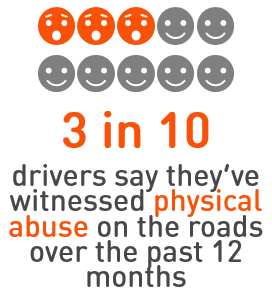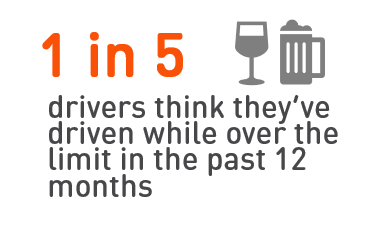The menaces on Britain’s roads – ranging from tailgating and texting at the wheel to drink-driving and road rage – have never been greater than they are today, our research suggests. The equivalent of more than 14 million car owners (36%) say in our 2019 survey that their top motoring-related concern is some form of illegal, anti-social or dangerous behaviour on the part of other drivers – behaviour that has the potential to put the lives of all other road users at serious risk.
Jump to:
- Aggression on the rise
- Phone use: a distraction danger
- In graphics: drivers' use of mobile phones
- Under the influence - drink-driving and drug-driving
- Testing the limits
- In graphics: drivers' admission to speeding
- Expert view
- What can be done?
Perhaps the most shocking evidence of the menace on our roads is the fact that three in every 10 motorists (30%) say they have personally witnessed some form of physical abuse related to a driving incident in the past 12 months. Almost half – the equivalent of around 20 million drivers – report that they have seen verbal abuse dished out to another motorist this year.

Meanwhile, there is a widespread feeling among drivers that standards of behaviour on our roads have deteriorated significantly over the course of the last decade: 76% of drivers believe that motorists are less patient today than they were in 2009, while 60% say they witness a greater number of road-rage incidents than they did 10 years ago.
It is hardly surprising, then, that the proportion of motorists who say that their single biggest fear is the aggressive behaviour of other drivers has doubled – from 4% to 8% – over the past 12 months. To put this into context, more drivers are worried about road rage, tailgating and excessive speeding than they are about congestion, for example, or the rising cost of insurance.
While aggression at the wheel poses significant levels of danger, the use of mobile phones by other drivers can be just as life-threatening – if not more so.
Over recent years, a spotlight has been shone on the scourge of handheld mobile phone usage – not just to make and receive calls, but also to compose and read messages, and even to take pictures and record videos. And this year’s Report on Motoring has found that this is the most commonly cited concern: 12% of drivers, or the equivalent of around five million people – say it is their biggest worry.
Staggeringly, however, our research also shows that there remains a significant hardcore of motorists – and in 2019 it appears to be younger drivers in particular – who admit to using their phones without hands-free kits while at the wheel, seemingly oblivious or indifferent to the dangers they pose to themselves and their passengers, not to mention other road users.
Almost a quarter of all drivers – just under 10 million motorists (23%) – confess that they make or receive calls on a handheld phone while they are driving
Almost a quarter of all drivers – the equivalent of just under 10 million motorists (23% – confess that they make or receive calls on a handheld phone while they are driving at least occasionally. Among drivers aged between 17 and 24, this rate is 51%.
Meanwhile, 17% of all drivers – and a shocking 35% of under-25s – say they check texts, email or social media while driving, despite the heightened level of risk involved in looking away from the road for seconds at a time.
The risk of being distracted by an incoming call or other form of notification appears to be worryingly high for many motorists.
Only a small minority of drivers (15%) follow the official government advice to put their phone in their glove compartment while driving: most people either keep their phone in a pocket or bag (45%) or put it on the seat or console next to them (25%). A quarter (24%) of motorists say they usually leave their phones switched on with the sound on when driving, rather than putting the device on silent or switching to some form of safe-driving mode.
A further threat to the lives of UK road users is drink- and drug-driving. The equivalent of almost four million motorists (10%) say that their biggest concern in 2019 is other road users under the influence either of alcohol or drugs.

But again, a significant number of people appear happy to take the risk of driving with alcohol in their systems. Some 19% of motorists – equating to more than seven million individuals – admit they have probably driven while over the drink-drive limit in the past 12 months, either shortly after having a drink, or the morning after drinking.
This proportion rises to just under half (44%) of motorists aged under 25, and 27% of those aged between 25 and 44. Almost a quarter of the motoring public – which would roughly equate to over nine million drivers (23%) – say that they normally consume at least once small alcoholic drink whenever they drive with friends or family members to a social occasion.
A high number of motorists also admit to another form of potentially dangerous lawbreaking – namely, speeding.
More than half of all drivers (55% – the equivalent of around 22 million motorists) say they exceed the 70mph motorway limit either occasionally or frequently – although this proportion has fallen steadily over the past five years.
But increasing numbers of drivers admit to breaking 30mph and 20mph limits on a regular basis: this year the proportion in both cases is 44%, well up on the 39% (for 30mph urban roads) and 36% (for 20mph urban area zones) recorded in 2018.
A third (33%) of drivers who regularly break 20mph limits justify their actions by saying that the limit is “inappropriate” for the roads it has been applied to.
"Current legislation focuses on handheld mobile phones, but the fact is that hands-free mobile use can be almost as bad. People think that because they are obeying the law by using a hands-free kit, they are safe and aren't being distracted -- but that's not the case."
Mike Quinton
Chief Executive, IAM Roadsmart

Find out what the RAC would like to see happen next when it comes to making the roads safer, as well as what the RAC has done recently to improve driving in the UK.

RAC Breakdown Cover from £7 a month*
*£7 a month for new single vehicle Basic cover. Comparison based on www.theaa.com closest equivalent cover as at 19/04/24.














